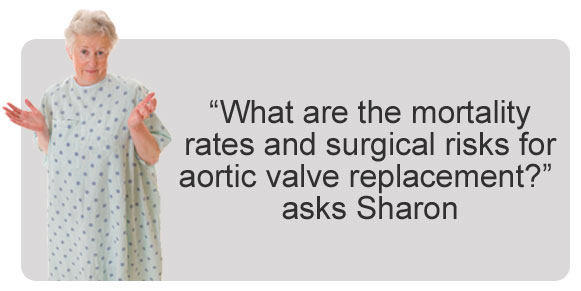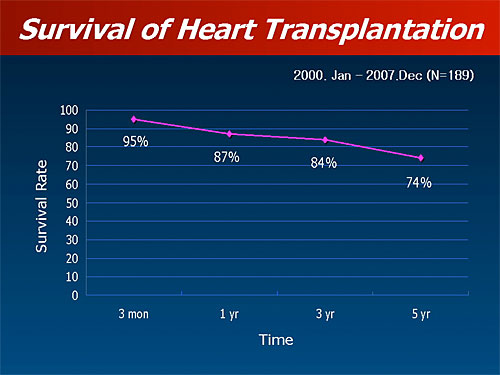
These results show that avr can be performed with acceptable operative risks in the elderly. It depends on the type of surgery, the health of the patient, the age of the patient, and other things like redo, emergency, etc.

I live in the uk and had a new aortic replacement 5 months ago where my aneurysm swelled to 9.2cm very low survival rate.
Open heart surgery valve replacement survival rate. But alive and kicking tired yes ache yes but one step at a time and grateful to the dedicated teams who pulled me through. The only situation in which i would suggest you to be worried is if your mom decides not to have the surgery, then the survival rate is 50% after two years and only 20 % after 5 years. You should also know that some noninvasive heart surgery procedures (including robotic heart valve repair) maintain a mortality rate close to 0.0%, according to certain heart care centers.
There is an associated prolonged. Without treatment, however, the mean survival for these patients is two to three years. The mortality rate for heart surgery varies quite a bit.
How long do you live after heart valve replacement? Long‐term survival after surgical aortic valve replacement: Although studies have shown that the heart valve replacement surgery survival rate is very high, there are other less invasive treatments for valve repair or replacement, such as minimally invasive aortic valve replacement or.
Due to the advances in the medical field and use of latest technologies and heart care facilities, doctors have reported a success rate of around 94 to 97 percent of such a surgery. You need to discuss this with. Replacement surgery of the heart valve definitely increases the life expectancy of the patient, improving quality of life.
However, these may vary for you depending on your age, your overall health, and the current status of your heart function. Healthtap doctors are based in the u.s., board certified, and available by text or video. So if her doctor decided to do the procedure, it must be done.
Now, it’s your turn to process the mortality rate for operations like aortic valve replacement and mitral valve repair. On the other hand if she decides to have the procedure, survival rate is very high. • the mortality rate for combined mitral and aortic valve replacement surgery is 10.6% and its survival rate is 80.95% at 10 years.
When i conducted my initial research for my book, the patient’s guide to heart valve surgery, the open heart surgery survival rate was 97% or 98% (depending on the reference). This is new and essential knowledge for the doctors who monitor these patients. Depending on your age, general health, and how severely damaged or faulty your heart valves are, invasive surgery may not be necessary.
Aortic stenosis (as) is the most common type of valvular heart disease and its prevalence is expected to double in the next two decades.1 there is no medical therapy to prevent the natural progression of the disease, but aortic valve replacement (avr) improves survival and relieves symptoms. Cardiac surgery can be performed in patients 85 years and older with good results. A new study suggests the answer depends on the age of the patient and which of the heart’s valves needs to be replaced.
Relative survival rates (excluding early deaths) were 84% 10 years after aortic, 68.5% after mitral and 80.9% after both aortic and mitral valve replacement. Pooled data from 85 studies estimated that 89.7% of people survived for two years after surgery, 78.4% at five years , 57.0% at 10 years, 39.7% at 15 years, and 24.7% at 20 years. Patients who have valve surgery reoperations have a somewhat higher risk of death compared with patients who have a primary operation, due to the overall decrease in health over time.
The complication rate was 31.5%. The survival rate for bypass patients who make it through the first month after the operation is close to that of the population in general. 8 baumgartner h, iung b, otto cm.
Early mortality (death within 30 days after surgery) was 5.9% after aortic valve replacement, 10.4% after mitral valve replacement and 10.6% after combined aortic and mitral valve replacement. In group c, the mean survival rate was 71.3% ± 8.2%, and the mean survival time was 9.54 ± 0.98 yr. Timing of intervention in asymptomatic patients with valvular heart disease.
Video chat with a u.s. 10.1016/j.jacc.2019.05.008 crossref medline google scholar; The researchers found no differences in loss of life expectancy between women and men.
Results the mean age of the cohort was 75 (±5.6) years. The mean survival rate in group o was 61% ± 14.6%, and the mean survival time after the last surgery was 8.03 ± 1.12 yr. I live in the uk and had a new aortic replacement 5 months ago where my aneurysm swelled to 9.2cm very low survival rate.
Left unoperated, patients who eventually become. I too in my opinion have similar moods to your partner.had mitral valve open heart surgery on 30. Pediatric heart surgery survival rates reflect the number of patients who survived within 30 days of the surgery or until the time they were discharged.
1 what is the survival rate for heart valve replacement surgery? I did just provide you with the real big truth about heart valve surgery. The overall actuarial survival at 1, 3, and 5 years was 90.8%, 84.2%, and 76.0%, respectively.
Nowadays the success rate of the heart valve replacement surgery has increased to a satisfactory level. The functioning of the valve in question is usually tested through a transesophogeal echo. Survival rates for heart valve replacement surgery are often used as predictors of how long patients can live beyond a certain number of years (5 years, 10 years) after the surgery.
It depends on the type of surgery, the health of the patient, the age of the patient, and other things like redo, emergency, etc. These results show that avr can be performed with acceptable operative risks in the elderly.